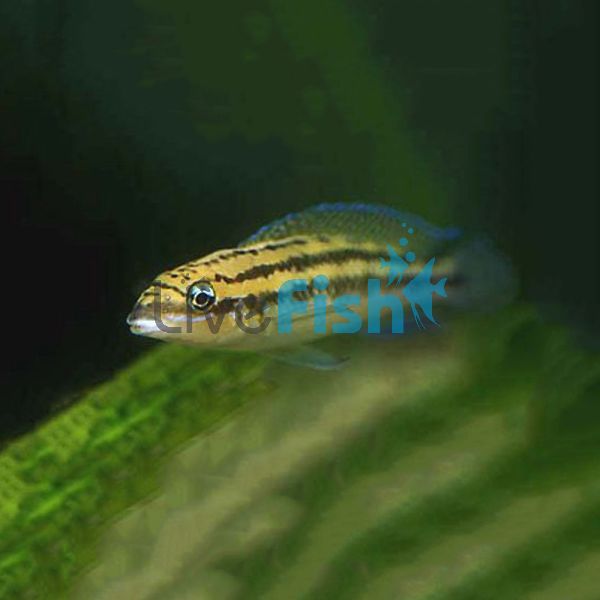Julidochromis Dickfeldi 2.5cm
The julidochromis cichlid has got to be one of the best entry-level African cichlids because of how hardy, peaceful, colourful and small it stays. The julidochromis also comes in many different species and one of which is the Dickfeldi. These stunning fish originally come from lake Tanganyika and are a beautiful and contrasted rock-dwelling cichlid that only reaches around 10 cm. This will make for a great breeding project or a fantastic addition to a community African cichlid tank.
Julidochromis Dickfeldi
The julidochromis cichlid has got to be one of the best entry-level African cichlids because of how hardy, peaceful, colourful and small it stays. The julidochromis also comes in many different species and one of which is the Dickfeldi. These stunning fish originally come from lake Tanganyika and are a beautiful and contrasted rock-dwelling cichlid that only reaches around 10 cm. This will make for a great breeding project or a fantastic addition to a community African cichlid tank.
The julidochromis dickfeldi has really simple but elegant colours which make these fish look adorable. They sport a white body colour with a trio of broken horizontal barring from head to tail. As they really mature, the males can develop a vibrant blue sheen on the fins which catches the light and shimmers amazingly. Julidochromis Dickfeldi is also relatively peaceful and they prefer to be kept in colonies which means they look absolutely stunning in numbers as their colour shines in the tank. Their rock-dwelling behavior also offers hours of fun as you see this species darting in and out of the aquascape showing off their curious behavior.
Breeding julidochromis is relatively easy and usually does not require any interference. In a species-only setting, you will inevitably see fry in the aquarium and as long as they are fed and have cover, they should grow up in the same tank with little problems. Males tend to be larger and carry more blue compared to females.
Tank Recommendations for your Julidochromis Dickfeldi
As the julidochromis cichlid only reaches around 10 cm, an adult pair of these fish can easily be kept in a tank of around 70 liters. They will however thrive in larger aquariums when kept in a colony of 6 or more. Since these cichlids spend a lot of time near the bottom of the aquarium it is best to ensure there is a decent footprint.
Julidochromis cichlids can be territorial, especially during the breeding time however their aggression is quite minimal compared to other African cichlids. They should be provided with a plentiful supply of caves for security and just to diffuse minimal aggression. These are also tropical fish that are best kept at 24-26 degrees.
Suitable Tank Buddies
The Dickfeldi cichlids can be kept with a range of other smaller and relatively peaceful African cichlids. Since these fish require a higher PH of around 8 the tank mates chosen should be adaptable to this.
Usually Compatible
Shell dweller species like neolamprologus mulifaciatus and smaller African cichlids such as black calves, furcifer cichlids, and other julidochromis.
Sometimes Compatible
Frontosa, smaller Mbuna species, and other larger but somewhat peaceful African cichlids like Mdoka white lips.
Rarely Compatible
Aggressive African cichlid species like fuscodichromis and polystigma.
Feeding your Julidochromis Dickfeldi
Julidochromis cichlids will take to aquarium foods very easily such as pellets, flakes, and frozen foods. Giving them a varied diet ensures that they have optimal nutrition. The ideal diet would be good quality, small and slow food, supplemented with green matter like algae flakes or sheets.
| Scientific Name | Julidochromis Dickfeldi |
|---|---|
| Care Level | Easy |
| Common Names | Julidochromis Dickfeldi, Juli Cichlids |
| Diet | Omnivore |
| Fish Family | Cichlidae |
| Lifespan (years) | 7 |
| Max. Length (cm) | 10 |
| Min. Tank Volume (l) | 70 Liters |
| Origin | Africa |
| Reef Safe | No |
| Sociability | Peaceful |
| Venomous | No |
| Water Conditions | 24-26° C, pH 7.5-8.5 |




